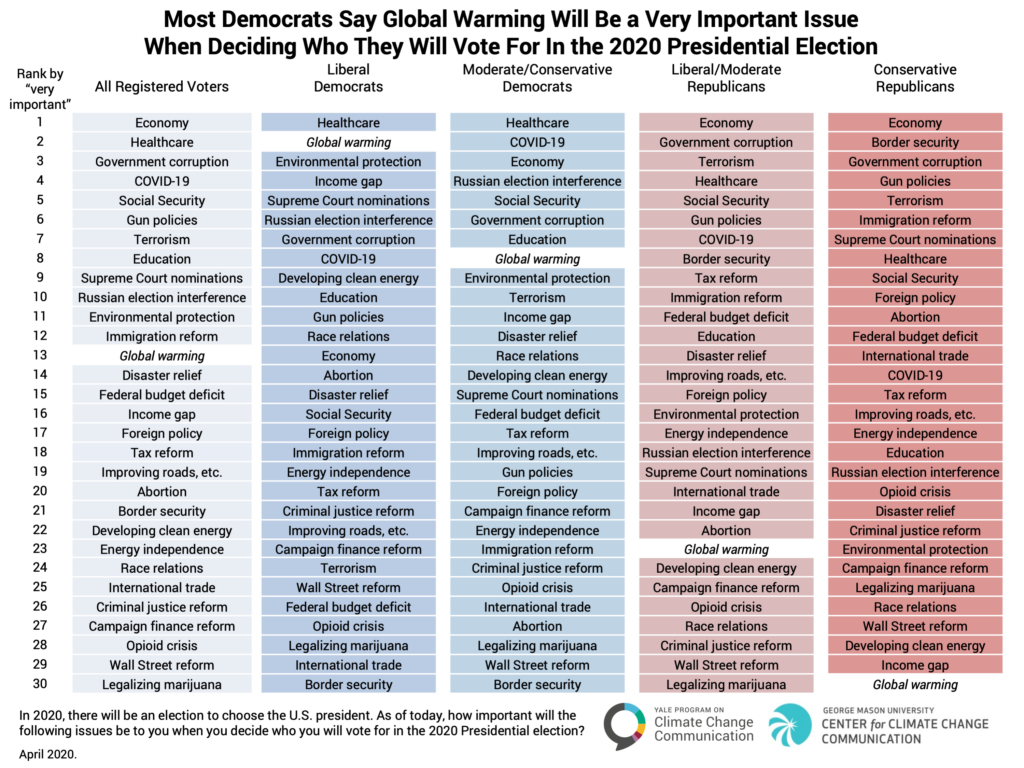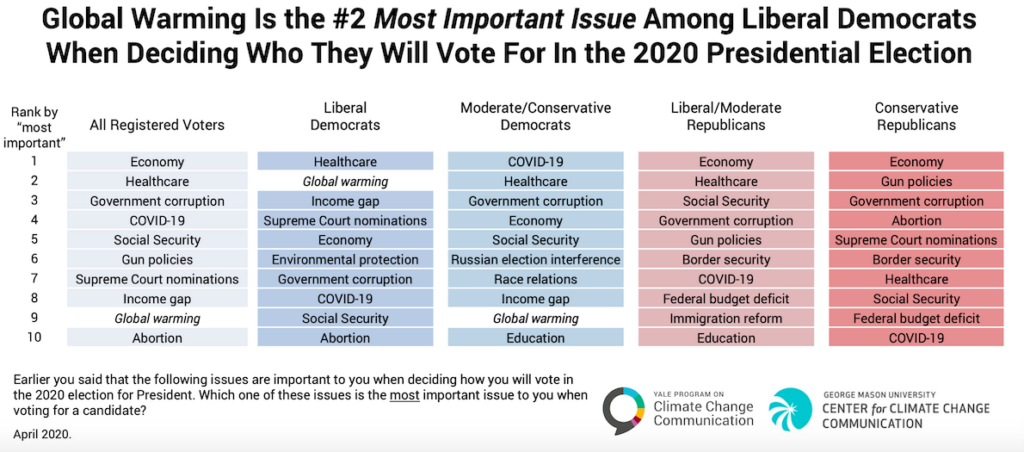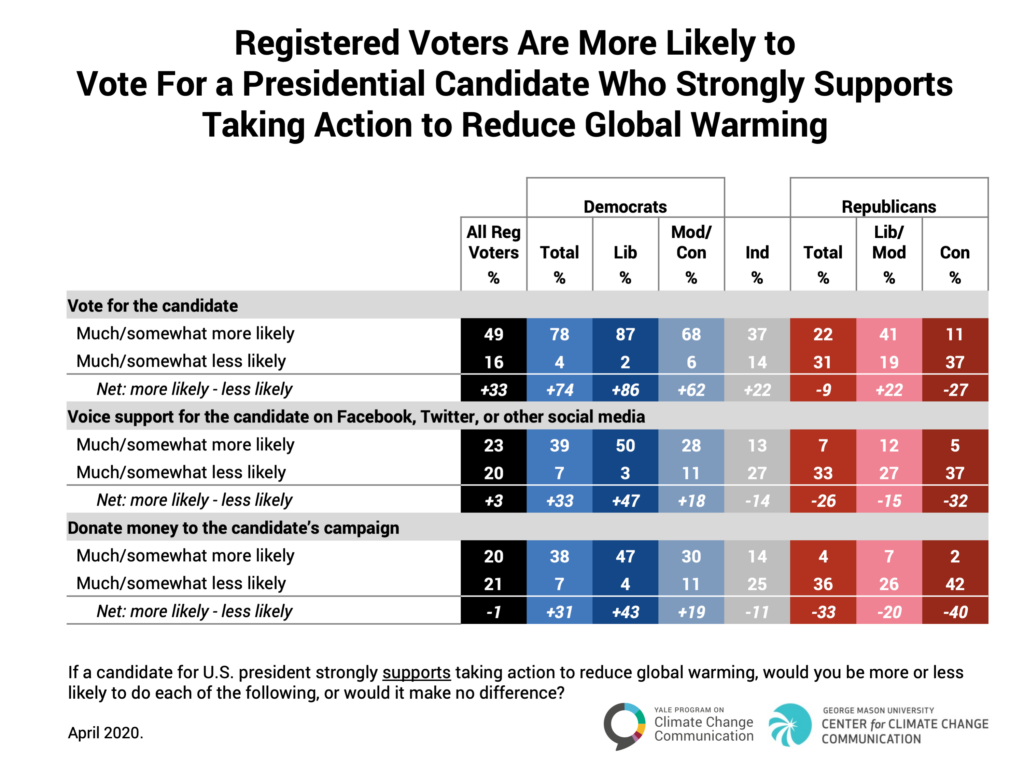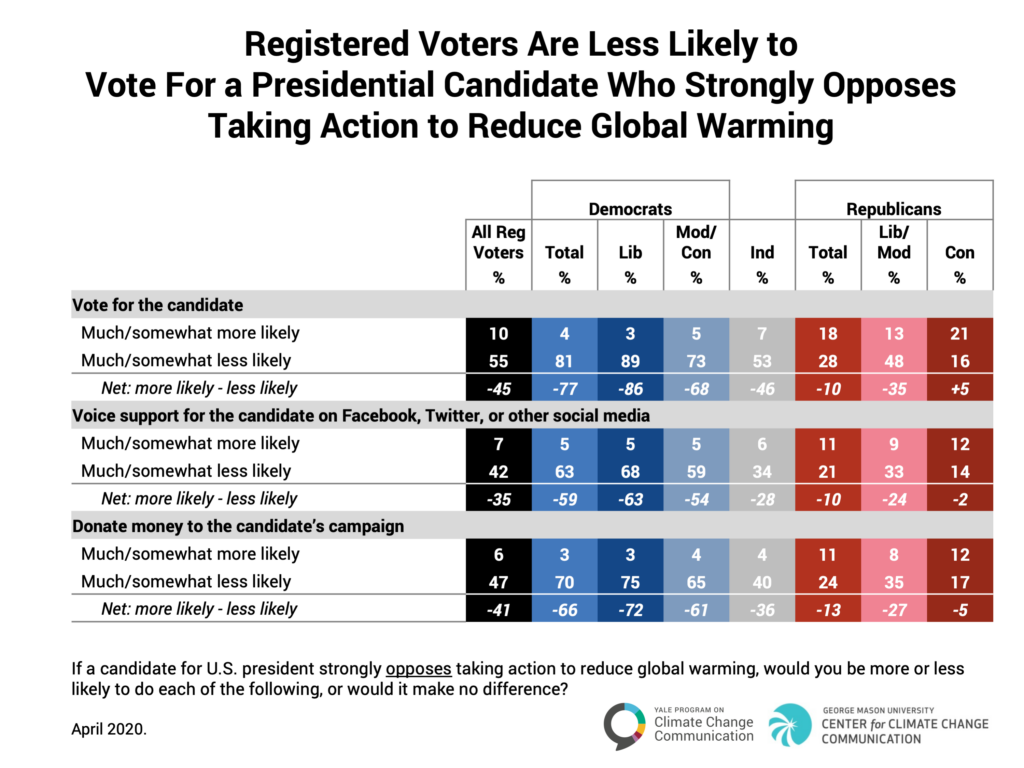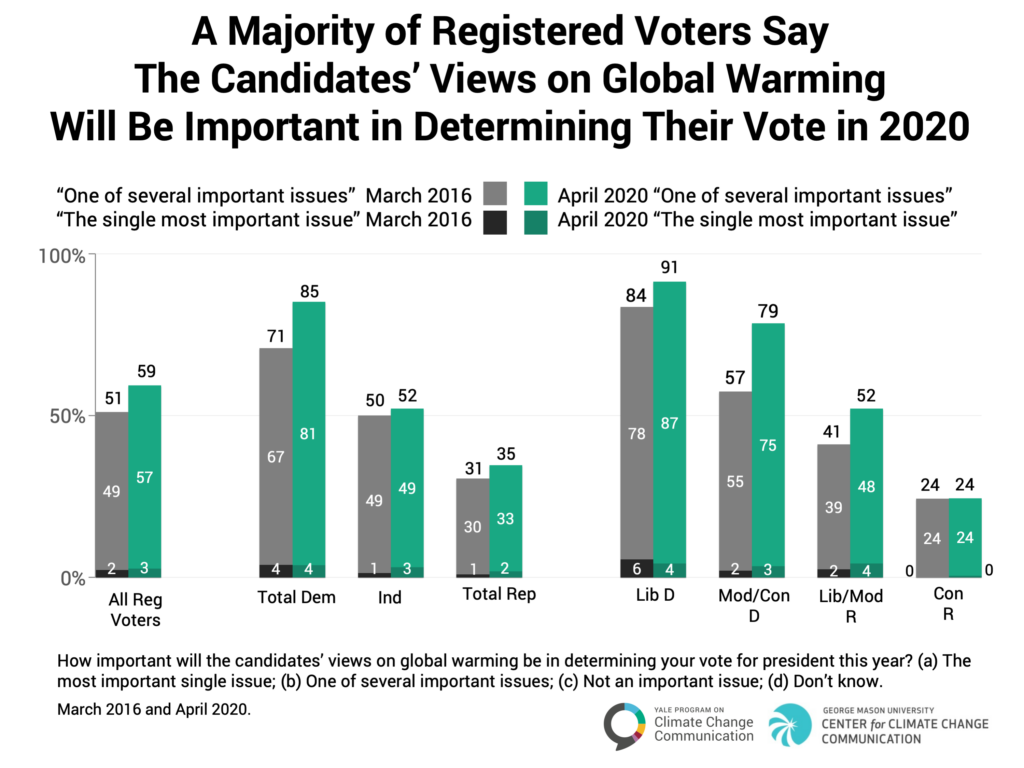Report · Jun 4, 2020
Politics & Global Warming, April 2020
By Anthony Leiserowitz, Edward Maibach, Seth Rosenthal, John Kotcher, Matthew Ballew, Parrish Bergquist, Abel Gustafson, Matthew Goldberg and Xinran Wang
Filed under: Beliefs & Attitudes, Behaviors & Actions and Policy & Politics
2. Global Warming as a Voting Issue
2.1. Most Democrats say global warming will be a very important issue when deciding who they will vote for in the 2020 presidential election.
Global warming is the 13th most highly ranked issue registered voters say will be “very important” to their vote in the 2020 presidential election, with 43% saying it will be very important (see Data Tables, pp. 48–57).It is important to note that this survey was conducted prior to the killing of George Floyd on May 25, 2020 and the national protests against police brutality and systemic racism that followed. Other polls indicate that race relations and criminal justice reform have greatly increased as voting issue priorities in response to these events. The nation’s political context has changed dramatically since this survey data was collected and the results should be interpreted with that in mind. This is within the margin of error of our previous survey, in November 2019, when 45% of registered voters said it would be very important to their vote, and is five percentage points higher than in our survey one year ago (April 2019), when 38% of registered voters said so.
Among Democrats, seven in ten (70%) say global warming will be a very important issue in determining their vote for president (compared with 72% in November 2019 and 64% in April 2019). This includes 82% of liberal Democrats and 57% of moderate/conservative Democrats. Global warming is the 2nd most important voting issue among liberal Democrats while environmental protection is 3rd. Among moderate/conservative Democrats, global warming ranks 8th, with environmental protection 9th. By contrast, global warming is near or at the bottom of presidential voting priorities among Republicans.
After each respondent rated how important each of the 30 issues would be to their vote in the 2020 Presidential election, we showed them the list of issues they had rated highest and then asked, “Which one of these issues is the most important issue to you when voting for a candidate?”
Using this method, global warming is the #9 ranked voting issue among all registered voters, with 4% of registered voters saying it is their most important issue (see Data Tables, p. 58). For context “the economy” is the #1 most important issue for registered voters, with 18% saying it is the most important issue.
Among Democrats, global warming is the #4 most important voting issue (8% of Democrats), with healthcare #1 (17% of Democrats). Global warming is the #2 most important issue among liberal Democrats (10% of liberal Democrats) and #9 among moderate/conservative Democrats (4% of moderate/conservative Democrats). Global warming was near the bottom of the most important issue list for Republicans.
The percentages for all 30 voting issues can be found in the Data Table on p. 58.
2.2. Registered voters are more likely to vote for a presidential candidate who strongly supports taking action to reduce global warming.
Registered voters say they are more likely to vote for a presidential candidate who strongly supports taking action to reduce global warming. When asked if they would be more or less likely to vote for a presidential candidate who strongly supports action to reduce global warming, or if it would make no difference, registered voters are three times as likely to say they would be more likely (49%), rather than less likely (16%) to vote for such a candidate, a net difference of +33 percentage points.
Democrats say they are much more likely than less likely to vote for a presidential candidate who strongly supports taking action to reduce global warming (+74 percentage points, an increase of 13 percentage points since we last asked this question at the same point in the presidential cycle in March 2016). Likewise, Independents and liberal/moderate Republicans say they are both +22 points more likely to vote for such a candidate. Conservative Republicans, however, say they are less likely to vote for such a candidate (-27 points).
Democrats say they are more likely to voice support on social media for a candidate who supports taking action to reduce global warming (+33 points, an increase of seven percentage points since March 2016). Republicans, conversely, say they are less likely to voice support on social media (-26 points). Democrats say they are more likely to donate money to the campaign of a presidential candidate who supports climate action (+31 points, an increase of 10 percentage points since March 2016), but Independents and Republicans say they are less likely to (-11 and -33 points, respectively).
2.3. Registered voters are less likely to vote for a presidential candidate who strongly opposes taking action to reduce global warming.
Conversely, Americans say they are less likely to vote for a presidential candidate who strongly opposes taking action to reduce global warming. When asked if they would be more or less willing to vote for a presidential candidate who strongly opposes action to reduce global warming, registered voters say they would be more likely to vote against such a candidate, than to vote for them by a margin of about 5 to 1 (55% vs. 10%, respectively, a net difference of -45 percentage points).
Democrats, Independents, and liberal/moderate Republicans all say they are less likely to vote for a candidate who opposes climate action: Democrats, -77 percentage points (a larger difference by 14 percentage points from the last time we asked this question at the same point in the presidential cycle in March 2016); Independents, -46 percentage points (a larger difference by 15 percentage points since March 2016); liberal/moderate Republicans, -35 points (a larger difference by 11 percentage points since March 2016). Conservative Republicans, however, say they are more likely to vote for such a candidate (+5 percentage points).
Democrats, Independents, and Republicans say they are less likely to voice support on social media (-59, -28, and -10 percentage points, respectively), or donate money to the campaign of a candidate who opposes climate action (-66, -36, and -13 points, respectively).
2.4. A majority of registered voters say the candidates’ views on global warming will be important in determining their vote in 2020.
More than half of registered voters say the candidates’ views on global warming will be one of several important issues in determining their vote for president in 2020 (57%), with an additional three percent saying it will be the most important single issue. A large majority of Democrats say global warming will be one of several important issues (81%) or the most important issue (4%). About half of Independents say it will be one of several issues (49%) or the most important issue (3%). More than half of Republicans (57%) say the candidates’ views on global warming will not be an important issue in determining their vote for president.
The proportion of Democrats who say the candidates’ views on global warming will be one of several important issues in determining their vote for president has increased by 14 percentage points since we last asked this question at the same point in the 2016 presidential election cycle (in March 2016).
